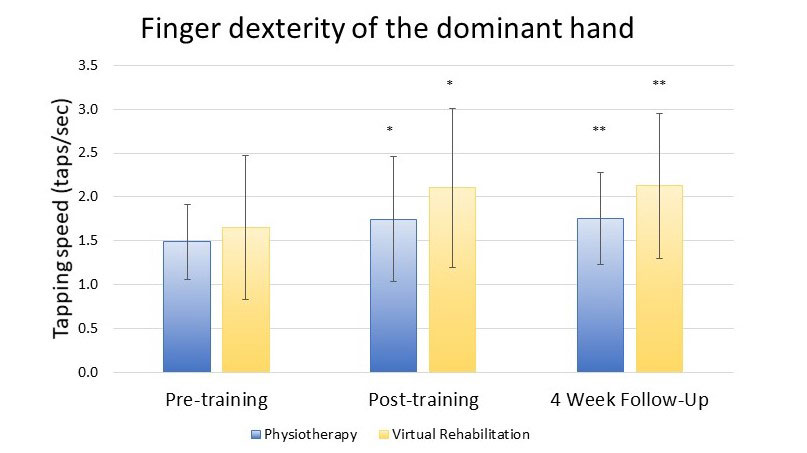Session Information
Date: Tuesday, November 12, 2019
Title: Systemic Sclerosis & Related Disorders – Clinical Poster III
Session Type: Poster Session (Tuesday)
Session Time: 9:00AM-11:00AM
Background/Purpose: Hand involvement due to increased skin thickness and skin collagen content is one of the first manifestations of systemic sclerosis (SSc) leading to a reduced joint mobility, flexion contractures and an reduced ability to perform activities of daily living (ADL) (Young et al., 2016). However, successful execution of ADLs not only relies on hand mobility, but also finger dexterity (Perez-Marmol et al., 2017). The activation of small muscles to synchronise hand and finger movement during ADLs is under neural control and reduced use of muscles leads to inefficient recruitment of motor units, and therefore reduced motor skills. Recommended hand exercises for SSc (Young et al., 2016) train range of motion, but less so dexterity. Virtual rehabilitation programmes have shown beneficial effects on both range and motor control (Levin et al., 2015). The aim of this study was to compare the effect of physiotherapy and virtual rehabilitation on finger dexterity and ability to perform ADLs.
Methods: Twenty SSc patients were recruited from a rheumatology clinic (mean age: 54.8yrs± 23.1yrs; female: n=19, male = 1) and randomly split into two groups (each n= 9, drop out: n =2) performing 90min of hand exercises per week for four weeks. One group followed a novel virtual rehabilitation programme, involving playing a computer game using hand movements. The second group completed a physiotherapy exercise regime. Prior to, immediately after and four weeks after completion of the exercises patients filled in the Cochin Hand Function Scale (CHFS). A finger dexterity test on a customised keyboard was completed using digits 2-4 and the average tapping speed over 15 seconds was calculated. A two-way mixed design ANOVA for the CHFS and finger dexterity test was conducted in SPSS and the change in CHFS and dexterity were correlated using bivariate two-tailed Pearson correlation.
Results: Both interventions showed significant improvements in ability to perform ADLs (Figure 1) (p = 0.03) and finger dexterity (Figure 2) (p = 0.02) when comparing pre-training and post-training tests. Whilst finger dexterity was maintained over the 4-week wash out period (post-training to 4-Week follow up), the ability to perform ADLs was not sustained in the virtual rehabilitation group (p = 0.05). No intervention programme showed a significantly better improvement than the other group on either outcome measure (p = 0.401). Change in CHFS and finger dexterity between test sessions was not correlated (r = -0.09, p= 0.72). This pattern was identical in the non-dominant hand, showing there is no effect of hand dominance.
Conclusion: Exercise improved both functional and neural aspects of hand function. The improvement in finger dexterity suggests that patients not only suffer a structural limitation but also a loss in fine motor skills. Finger dexterity could therefore form an important new outcome measure to assess the key clinical issue of reduced hand function in SSc. Further hand function rehabilitation in SSc should integrate a component to address dexterity in addition to mobility. The loss of neural control over finger motion in SSc should be assessed further assessed in future research.
To cite this abstract in AMA style:
Eusterwiemann E, Anderson M, Robinson M, Barton G. ‘If You Don’t Use It, You Lose It’: Rehabilitation of Finger Dexterity and Ability to Perform Activities of Daily Living in Systemic Sclerosis [abstract]. Arthritis Rheumatol. 2019; 71 (suppl 10). https://acrabstracts.org/abstract/if-you-dont-use-it-you-lose-it-rehabilitation-of-finger-dexterity-and-ability-to-perform-activities-of-daily-living-in-systemic-sclerosis/. Accessed .« Back to 2019 ACR/ARP Annual Meeting
ACR Meeting Abstracts - https://acrabstracts.org/abstract/if-you-dont-use-it-you-lose-it-rehabilitation-of-finger-dexterity-and-ability-to-perform-activities-of-daily-living-in-systemic-sclerosis/


